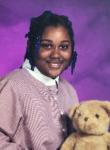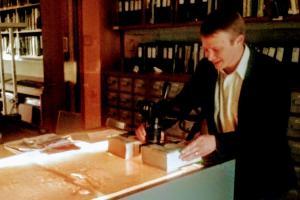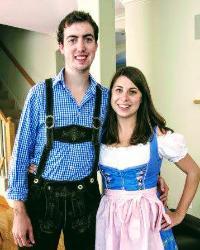The Department of Modern and Classical Languages is pleased to introduce three new full-time members that are joining us for the Fall 2020 semester.
 Arielle Akines, Ph.D., joins us from the University of Houston in a new role as the Language Resource Center Director.
Arielle Akines, Ph.D., joins us from the University of Houston in a new role as the Language Resource Center Director.
What is a Language Resource Center (LRC), anyway?
A successful Language Resource Center is a physical space that facilitates authentic language exchange, provides resources for intercultural enrichment, and fosters community-building opportunities for students and the greater Wheaton College community to share and learn about language.
Students can take exams and borrow technology equipment to practice speaking, record videos, and conduct language interviews. They can find language-related resources like books, music, movies, and computers. Students may also print, attend special events, and contribute to our weekly language community board.
What are you most excited about in your new role?
I am most excited to build a community of students and faculty that share the same passion for Modern and Classical Languages. There are many language-learning experiences that can be digitized and moved online, but the importance of the LRC at Wheaton College is the physical connection and community that will grow and thrive here.
How do you define the mission of the LRC at Wheaton College?
The mission of the LRC is to support the Wheaton College community in their teaching and learning of Modern and Classical Languages. The LRC is a resource that fosters authentic intercultural enrichment opportunities from a Christian perspective.
OK, last question: Who is this kid?
 This photo is from a pivotal moment in my life during 4th grade, the 1999-2000 school year. My brother and I had just won the last two spots in a magnet school lottery. During this school year, I found my passion for education and the Spanish language!
This photo is from a pivotal moment in my life during 4th grade, the 1999-2000 school year. My brother and I had just won the last two spots in a magnet school lottery. During this school year, I found my passion for education and the Spanish language!
Welcome, Arielle!
Andrew Burlingame, Ph.D. (University of Chicago) joins the Classical Languages section as the new Assistant Professor of Hebrew.
 Andrew Burlingame specializes in Northwest Semitic languages (including Hebrew, Aramaic, Phoenician, and Ugaritic) with a focus on the history of textual production and written communication in the Eastern Mediterranean of the late-second and early-first millennia BCE. His current research brings together diachronic linguistics, linguistic typology, formal semantics, and study of the material characteristics and contexts of inscribed tablets in order to shed light on the history of alphabetic writing and scribal practice at Ugarit. He is also engaged in a number of projects examining the points of intersection between language, identity, and politics in Ugaritic and Phoenician epigraphs.
Andrew Burlingame specializes in Northwest Semitic languages (including Hebrew, Aramaic, Phoenician, and Ugaritic) with a focus on the history of textual production and written communication in the Eastern Mediterranean of the late-second and early-first millennia BCE. His current research brings together diachronic linguistics, linguistic typology, formal semantics, and study of the material characteristics and contexts of inscribed tablets in order to shed light on the history of alphabetic writing and scribal practice at Ugarit. He is also engaged in a number of projects examining the points of intersection between language, identity, and politics in Ugaritic and Phoenician epigraphs.
How did you become interested in the Ancient Hebrew Language in the first place? What’s your story?
I have been interested in other languages and writing systems for about as long as I can remember. The process of learning to understand an unfamiliar language or interpret a new script is a thrilling one, not only because of the opportunity it provides to engage in conversations with others (spoken or written), but also because such study gives us a chance to consider and appreciate the intricacy of human language itself. Goethe once stated rightly that those who have not studied other languages really don’t even know their own. Interacting with other languages, in other words, allows us to see human language—including our own—with fresh eyes, sensitized to the many means by which people express their ideas, desires, fears, and certainties.
My interest in Hebrew grew during my time as an undergraduate Classical Languages major at Wheaton College. I was especially excited to learn how Hebrew serves as a point of entry into the study of many other Semitic languages, including some that remain relatively poorly understood. The excitement of researching such languages comes from making sense out of previously unintelligible texts, discovering new words, and identifying connections between documents from different archaeological sites hundreds of miles apart. Such efforts allow us to understand the past—including the time periods during which the Hebrew Bible/Old Testament was being written and transmitted—with clearer vision and better-grounded frameworks.
What do you think is exciting about studying Hebrew at Wheaton College specifically?
The faculty and course offerings at Wheaton allow students here a unique opportunity to study ancient languages (like Hebrew) in their historical and linguistic contexts. There aren’t very many undergraduate institutions where students can study Hebrew (biblical and extra-biblical), Aramaic, Ugaritic, and Akkadian, all while taking courses in biblical interpretation, ancient Near Eastern history, and archaeology. That such varied offerings are available at a liberal arts college like Wheaton is unique, and it allows students to pursue their interests and develop their expertise in a number of fruitful directions that would not ordinarily be available prior to graduate school.
 Burlingame studying an inscription held in the archives of the Louvre (October 2019).
Burlingame studying an inscription held in the archives of the Louvre (October 2019).
Melissa Elliot, Ph.D. (Michigan State University) joins us this Fall as Assistant Professor of German and German Studies.
 Professor Elliot's research interests center primarily on intersections of German and music, stemming from her background as a German and Vocal Performance double major at Calvin University. She is particularly interested in the role of music as narrative voice in German cinema. Professor Elliot's recently published article explores how music can function in film adaptations of novels to comment upon and interpret the source text. Her other research interests include East German studies, Holocaust studies, gender studies, and the use of music in the language classroom. In her free time, Professor Elliot likes to sing, hike, travel, and spend time with her husband and son.
Professor Elliot's research interests center primarily on intersections of German and music, stemming from her background as a German and Vocal Performance double major at Calvin University. She is particularly interested in the role of music as narrative voice in German cinema. Professor Elliot's recently published article explores how music can function in film adaptations of novels to comment upon and interpret the source text. Her other research interests include East German studies, Holocaust studies, gender studies, and the use of music in the language classroom. In her free time, Professor Elliot likes to sing, hike, travel, and spend time with her husband and son.
What is most compelling to you about the German language?
As a singer, I find the sound of sung and spoken German very beautiful (despite its reputation otherwise). I also find the grammar very logical and enjoy being able to “figure it all out.”
How did you become interested in German in the first place? What’s your story?
Although no one in my family speaks German and although I have no German heritage, the German language and culture has always intrigued me. When I was a child, there were some German children in my classes (their parents were doing one or two-year job placements at a nearby German company), and I was just drawn to them. When I would go to their houses and hear them speaking German with their families, I couldn't get enough. I ended up taking German in high school and then visited Germany for the first time after graduating. The newness and strangeness of everything (at least I thought so at the time) was one of the most exciting things I had ever experienced. From then on, I was hooked. I have pursued German study ever since and will probably never stop.
What do you think is exciting about studying German at Wheaton College specifically?
I find the mixture of faith and German language study at Wheaton College compelling. At Wheaton, we understand language and cultural learning to be an act of hospitality and love toward another people group. It is no small task to decenter yourself in order to gain the skills to meaningfully engage (linguistically and culturally) with others who don't speak your language. In this way, Christian language learners take steps toward fulfilling the biblical imperative to love and care for the stranger. At Wheaton, we have the opportunity to approach German study through this lens.
 Professor Elliot in 2011 with her husband, Drew, sporting their traditional German apparel (Tracht) purchased the year they lived in Munich, Germany.
Professor Elliot in 2011 with her husband, Drew, sporting their traditional German apparel (Tracht) purchased the year they lived in Munich, Germany.

